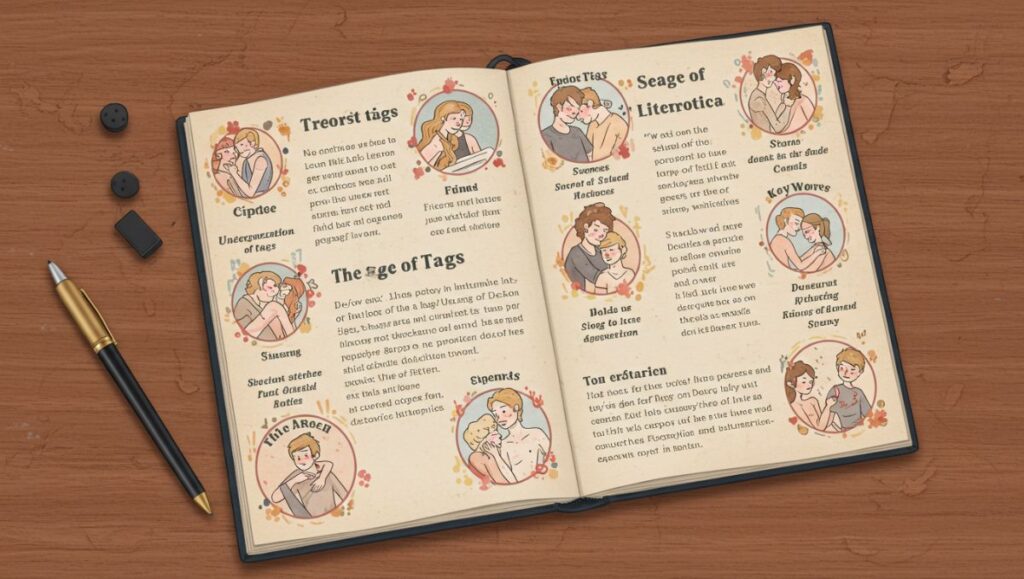The internet is filled with platforms where creativity thrives, and Literotica has become one of the most popular destinations for readers and writers of adult fiction. With thousands of new stories being published, organization is crucial. This is where tags come into play.
Literotica tags act as signposts that guide readers toward the stories they want and help writers make their works more visible. They are more than just labels—they are an essential part of how content is organized, discovered, and experienced.
What Are Literotica Tags?
In the simplest terms, tags are keywords or labels attached to a story that describe its content. On Literotica, tags might include:
-
The genre (romance, fantasy, science fiction).
-
The theme (erotic adventure, roleplay, taboo).
-
The tone (romantic, dark, humorous).
-
The characters or relationships involved.
They allow writers to categorize their stories accurately and help readers quickly identify what to expect.
Why Tags Matter on Literotica
For Readers
-
Personalized discovery – Readers can filter stories that match their interests.
-
Clarity – Tags act as a preview of the story’s theme before clicking.
-
Navigation – They make it easier to explore related stories.
For Writers
-
Visibility – The right tags make stories easier to find in searches.
-
Audience targeting – Writers can reach the right readers.
-
Community engagement – Tagging correctly builds trust with readers who value accurate labeling.
Categories and Popular Themes in Literotica Tags
Tags can represent both broad genres and specific subthemes. Common categories include:
-
Relationship Tags
-
Romance
-
Friends-to-lovers
-
Forbidden love
-
-
Fantasy and Roleplay Tags
-
Historical settings
-
Futuristic adventures
-
Roleplay dynamics
-
-
Tone and Atmosphere Tags
-
Dark and intense
-
Lighthearted and humorous
-
Emotional or dramatic
-
-
Niche Tags
-
Very specific interests or sub-genres that cater to smaller communities.
-
By combining multiple tags, a story can reach readers who are searching for very specific experiences.
How Tags Improve Discoverability
Literotica is a massive platform, and without tags, readers might struggle to find relevant content. Tags act as search engine optimization (SEO) within the platform.
-
A story tagged with “romance, humor, fantasy” will appear in searches for any of those themes.
-
Readers who click on a tag can instantly explore other works with the same theme.
-
Tags create organic connections between stories, forming a web of related content.
This increases exposure for writers and enhances satisfaction for readers.
Best Practices for Writers Using Literotica Tags
-
Be Specific – Instead of tagging only “romance,” add supporting tags like “romantic comedy” or “long-distance love.”
-
Avoid Over-tagging – Too many unrelated tags confuse readers and may reduce trust.
-
Match Reader Expectations – Make sure the story delivers on the tags promised.
-
Combine Broad and Narrow Tags – Use a mix to capture both general and niche audiences.
-
Stay Updated – Popular tags change over time; keep an eye on trending categories.
Reader Experience: Finding the Right Stories
For readers, tags are not just helpful—they are essential. They allow:
-
Browsing by interest instead of scrolling endlessly.
-
Avoiding content that doesn’t match their preferences.
-
Building collections of stories that align with their favorite themes.
Many readers even search directly through tags instead of using the general search bar.
Tags vs. Genres: Understanding the Difference
While genres represent broad categories (like fantasy, romance, or sci-fi), tags provide depth and detail.
-
Genre example: Fantasy
-
Tag examples within fantasy: Medieval castles, magical creatures, time travel, erotic quests.
Tags bring granularity to classification, making it easier to find exactly what a reader is looking for.
Evolution of Literotica Tags Over Time
When Literotica first began, categories were simpler and broader. Over time:
-
Reader demand for specificity increased.
-
Communities developed around niche tags.
-
The platform evolved tagging systems to handle growing complexity.
This evolution reflects the diversity of content and communities that Literotica supports.
Challenges and Controversies Around Tags
-
Overuse of Tags – Some writers use dozens of tags, which can feel misleading.
-
Misleading Tags – If tags don’t match the story, readers may feel disappointed.
-
Tag Proliferation – Too many niche tags can fragment search results.
-
Community Standards – Certain sensitive tags may create debates around moderation.
Despite these challenges, tags remain an indispensable part of the platform.
The Future of Tagging on Adult Story Platforms
Looking forward, Literotica and similar platforms may see:
-
Smarter AI tagging – Automatically suggesting tags based on content.
-
Personalized tag feeds – Recommending stories based on past reading habits.
-
Community-driven tagging – Allowing readers to contribute to tagging accuracy.
-
Cross-platform tagging systems – Integrating tags with other adult storytelling platforms.
Such innovations will make tags even more powerful and user-friendly.
Conclusion
Literotica tags are the backbone of story discovery and categorization. They empower readers to find what they love, help writers reach the right audience, and keep the platform organized despite its vast content library.
By understanding and using tags effectively, both writers and readers can create richer, more rewarding experiences. In the end, tags are not just labels—they are a vital part of storytelling, shaping how stories are found, shared, and enjoyed.






